SAFE Gasoline Campaign
Biofuels International Magazine: Obstacles must be removed to aid the development of biofuels, September 2019.
Moving beyond the RFS, Douglas A. Durante, executive director of the Clean Fuels Development Coalition
The global biofuels community is without a doubt watching the developments in the US with the Renewable Fuel Standard (RFS) and might be understandably confused. How is a program that was passed by the US Congress and supported by Democrats and Republicans alike, and happily signed into law by two different Presidents, so controversial? (read full article here).
CFDC’s VanderGriend and Durante raise the Alarm: Houston, We have a Problem.
An article by CFDC Member Dave VanderGriend and Director Doug Durante published in the Biofuels Digest was in response to the media coverage, both national television and print media, of the disastrous spill of 11,276 barrels of benzene-based octane-enhancer reformate in the Houston ship channel. The article made the clear point that reformate was a more genteel name for toxics, including benzene, a known carcinogen. Houston newspaper articles downplayed the heath hazards of the spill and petroleum industry representatives pointed to a Center for Disease Control and Prevention (CDC) report that reviewed thousands of air monitoring samples for a range of toxics. The report found that In the beginning, tests detected a benzene reading 14 times higher than the level of concern for short-term health effects about seven hours after the collision. “This reading wasn’t replicated, however, and no high-level detections were made after that.” Water is one of the most effective carriers of non soluble compounds and these carcinogens could be miles away. Was that an amazing clean up – or coverup?#Gasolinegate #SafeGasolineCampaign. Clean octane in the form of renewable ethanol can replace these carcinogens refiners use to increase octane and the public needs to understand the health hazards they are exposed to from consumer gasoline. The American Petroleum Institute stated in Congressional testimony as far back as 1948 that the safe threshold for benzene was zero. Since 1948 every health organization has classified benzene as a known human carcinogen – including the EPA.
Statement from the Clean Fuels Development Coalition: EPA Decision to Issue RFS Waivers Bad for Public Health & The Environment
“The Administration’s decision to issue Renewable Fuel Standard waivers and therefore remove low-carbon, low-toxin biofuels is a significant step backwards and damaging to our environment and public health. Studies show that higher blends of biofuels in gasoline can reduce air pollution and greenhouse gas pollution and save Americans money at the pump. Yet, again the EPA is choosing to side with the oil industry at the expense of the health and well-being of the American people.” ~ Doug Durante, Executive Director of Clean Fuels Development Coalition
Farmers Union Enterprises Releases Gasolinegate Report
CFDC member Doug Sombke of the South Dakotata Farmers Union and Chair of Farmers Union Enterprises released a new report today providing strong evidence that the 263 million gasoline vehicles on American roadways are emitting significantly more harmful emissions than being reported, and the U.S. Environmental Protection Agency (USEPA) is ignoring the dangers of toxic compounds in gasoline. Decades of petroleum industry influence over EPA has resulted in flawed testing and emissions calculations, and blocked competition from clean burning alternatives.
National Gasoline Public Education and Consumer Awareness Campaign
It’s Time—EPA: Make Gasoline SAFE! Gasoline and its emissions are one of the greatest threats to public health Americans face today. Transportation related pollution accounts for an estimated 50,000 premature deaths annually. When lead was removed from gasoline, it...
What’s in Our Gasoline is Killing Us
New Report Documents Connection Between Toxic Fuel Additives, Vehicle Emissions and Human Health Threats
A new report from CFDC calls emissions from consumer gasoline one of the biggest health threats facing the American public. The report links a wide range of respiratory and even neurological diseases to toxic carcinogenic compounds refiners use to increase octane in gasoline.
The new Fact Book entitled What’s in Our Gasoline Is Killing Us: Mobile Source Air Toxics and The Threat to Public Health is the result of research and review of hundreds of studies and medical and technical reports.
